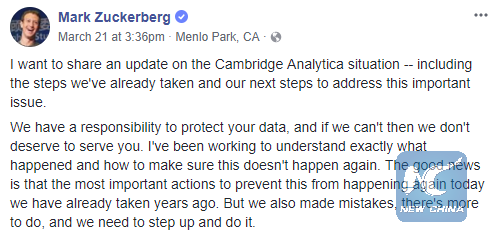
A man reads a full-page advertisment, taken out by Facebook CEO Mark Zuckerberg to apologise for the large-scale leak of personal data from the social network, on the backpage of a newspaper, in Ripon, England on March 25, 2018. (Xinhua/AFP)
SAN FRANCISCO, March 25 (Xinhua) -- Facebook CEO Mark Zuckerberg Sunday apologized in full-page ads in several British and U.S. newspapers for a data breach scandal that puts the world's largest social media company under tremendous pressure.
The Facebook ads appeared in British newspapers such as the Observer, the Sunday Times, the Mail on Sunday, Sunday Mirror and Sunday Express, as well as U.S. newspapers the New York Times, Washington Post and Wall Street Journal.
"You may have heard about a quiz app built by a university researcher that leaked Facebook data of millions of people in 2014," said the ads signed by Zuckerberg, who was referring to the British consulting company, Cambridge Analytica, which was accused of manipulating Facebook data during the 2016 U.S. presidential election.
"This was a breach of trust, and I'm sorry we didn't do more at the time. We're now taking steps to ensure this doesn't happen again," Zuckerberg said in the the ads.

File Photo: Founder and CEO of Facebook Mark Zuckerberg gives a speech during the unveiling ceremony of the new Samsung Galaxy S7 and Galaxy S7 edge smarthphones on the eve of the official start of the Mobile World Congress (MWC) in Barcelona, Spain, Feb. 21, 2016. (Xinhua/Lino De Vallier)
He noted that Facebook was now limiting apps from getting users' data when they sign in, and it was looking into "every single app" that had access to large data sets.
"If it finds other offenders, it will ban them and tell everyone affected," he said.

Mark Zuckerberg's post about the data breach on his Facebook page.
Zuckerberg's apology came a few days after Facebook was criticized for failing to properly protect the data of over 50 million users.
The data was said to be inappropriately used by Cambridge Analytica in activities allegedly connected with U.S. President Donald Trump's election campaign in 2016.

